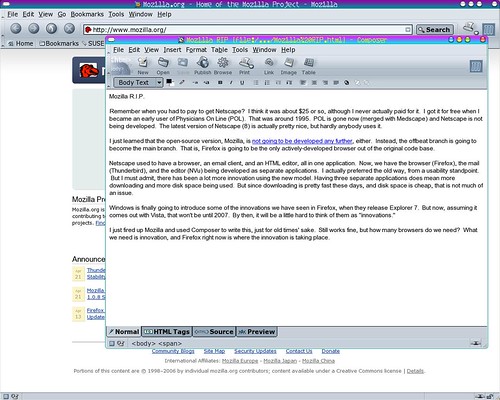Mozilla RIP
Remember when
you had to pay to get Netscape? I
think it was about $25 or so, although I never actually paid for it.
I got it for free when I became an early user of Physicians On
Line (POL). That was around 1995. POL is gone now (merged
with
Medscape) and Netscape is not being developed. The latest version
of
Netscape (8) is actually pretty nice, but hardly anybody uses it.
I just learned that the open-source version, Mozilla, is not going to be developed any further, either. Instead, the offbeat branch is going to become the main branch. That is, Firefox is going to be the only actively-developed browser out of the original code base.
Netscape used to have a browser, an email client, and an HTML editor, all in one application. Now, we have the browser (Firefox), the mail (Thunderbird), and the editor (NVu) being developed as separate applications. I actually preferred the old way, from a usability standpoint. But I must admit, there has been a lot more innovation using the new model. Having three separate applications does mean more downloading and more disk space being used. But since downloading is pretty fast these days, and disk space is cheap, that is not much of an issue.
Windows is finally going to introduce some of the innovations we have seen in Firefox, when they release Explorer 7. But now, assuming it comes out with Vista, that won't be until 2007. By then, it will be a little hard to think of them as "innovations."
I just fired up Mozilla and used Composer to write this, just for old times' sake. Still works fine, but how many browsers do we need? What we need is innovation, and Firefox right now is where the innovation is taking place.
I just learned that the open-source version, Mozilla, is not going to be developed any further, either. Instead, the offbeat branch is going to become the main branch. That is, Firefox is going to be the only actively-developed browser out of the original code base.
Netscape used to have a browser, an email client, and an HTML editor, all in one application. Now, we have the browser (Firefox), the mail (Thunderbird), and the editor (NVu) being developed as separate applications. I actually preferred the old way, from a usability standpoint. But I must admit, there has been a lot more innovation using the new model. Having three separate applications does mean more downloading and more disk space being used. But since downloading is pretty fast these days, and disk space is cheap, that is not much of an issue.
Windows is finally going to introduce some of the innovations we have seen in Firefox, when they release Explorer 7. But now, assuming it comes out with Vista, that won't be until 2007. By then, it will be a little hard to think of them as "innovations."
I just fired up Mozilla and used Composer to write this, just for old times' sake. Still works fine, but how many browsers do we need? What we need is innovation, and Firefox right now is where the innovation is taking place.


 :
Joseph j7uy5
:
Joseph j7uy5
<< Home